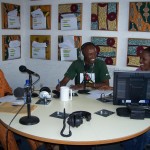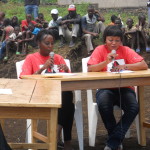Creating Space for Discussion
By Amelia Hight
Yesterday I had my first trip out of Kigali since arriving here to serve as a program-learning intern for SFCG-Rwanda a month ago. The M&E Coordinator Mugisha and I traveled to the university town of Huye to conduct an interview with a radio journalist at Salus Radio as part of a follow-up to a March journalist training session for our project, Non-State Actors and Local Authorities in Development Actions.
This is my second time in Rwanda, having spent three months in the country as a research fellow in 2006, and I remember well the road to Huye (which was then called Butare). At that time it was the nicest road in Rwanda and a matter of some pride to most Rwandans. Today, however, given all the newly paved roads in and leading from Kigali to the provinces, the road to Huye is somewhat unremarkable. There has been a good deal of economic development in Rwanda since I was here last, most of it taking place in the capital. In addition to newly surfaced roads, there are new buildings and businesses through Kigali, including western-style coffee shops and even a mall with a large and well stocked grocery store.
However, when you leave the capital, the old, less-developed Rwanda is still visible in the fields of sorghum, bananas, and maize. It is evident in the people walking beside the road with their bundles of goods and riding or walking bicycles laden with containers and bushels of all sizes up and down hill after hill. Life on and off this busy thoroughfare seems to continue as it did before, largely unaffected by the economic development in Kigali. Aside from the name, Huye is little changed as well. It still has a small town feel and during the times of year when university is in session (as it is now) the main street teems with young, sharply dressed Rwandans.
Upon arrival, Mugisha and I went straight to the Radio Salus station to meet with a radio journalist for Ubutaka Bwacu, a SFCG-supported radio program on land issues in Rwanda. We spoke with him for 45 minutes about his experience during our training, his understanding of the Common Ground approach to journalism, and the multiple challenges that journalists face in Rwanda. It was an enlightening conversation and I was particularly struck by his insistence that the role of journalist in Rwanda should be that of a medium between different sides in a conflict (or between citizens and the government) and the importance of reporting on instances of collaboration and cooperation as well as conflict. He told us several stories about conflicts that were successfully ended with the help of the radio program and the information that it provides for Rwandans around land issues. Given the limits to freedom of press in this country, it was reassuring to know that this reporter and SFCG-supported radio program are creating at least some space for information sharing and dialogue around these sensitive issues.
Since returning to Rwanda, I have participated in many conversations about conflict transition and development. To me, it seems that the best indicator for positive peace in this country is the presence of space for dialogue around issues that have the potential to cause or contribute to conflict. I am very pleased to be part of Search for Common Ground as it works to create this space by providing platforms for discussion and capacity building for Rwandans to lead the dialogue.
###
Amelia Hight is an international intern in our Rwanda office. Amelia is currently works towards a Master of Arts in Law and Diplomacy, from The Fletcher School at Tufts University










“largely unaffected by the economic development in Kigali”
I suggest that looking out the vehicle window on your first day out of Kigali does not give you an account of what has changed since 2006. Rwanda is a bit more complex than that if you are interested in finding out rather than just trotting out pre-conceived prejudices.
For example, Health insurance? mass immunisation programmes? one cow per family programme? 9 years free education? extensions to the electric grid? more classrooms? more hospitals? improved performance by girls in school? Mass mobile phone use?
All these things extend outside Kigali and if you really think that the govt only cares about Kigali then why are they bothering with initiatives such as these?
And finally, you cannot achieve any of these things without peace and security. But you see Rwanda as without ” positive peace” (are the above matters not positive?), “the citizens versus the govt” (who builds hospitals, classrooms etc if it is not citizens?) and a country in “conflict”.
If you really want to do something useful in Rwanda please spend some time to find out what has been and is really going on.
Blue: I agree with you that Rwanda has a complex history and the current political (and economic) situation is anything but simple. I also agree that truly contextualized knowledge on Rwanda (or any place really) is only possible if you spend your life in the country. I think it is very fair to say that I don’t know the Rwanda that Rwandans know, but my main point here is that it is very difficult to hear the voice of average Rwandans on these or other issues because they cannot easily access platforms and opportunities for dialogue.
Rwanda has received quite a bit of well-deserved attention from international donors for the economic and social developments that you listed above. However, it is my understanding that Rwanda still faces many challenges, particularly around access to land and limited availability of employment and capital. It is a densely populated and quickly urbanizing country. Most of the development has focused on the capital and (as is true in most countries) is enjoyed primarily by an elite class of Rwandans. While some of the government policies that you listed seem to have had very positive affects, others, such as strict housing and informal economy regulations have increased the burden on many Rwandans.
Moreover, while economic development is important for the future of Rwanda, equally important is the ability of Rwandans to drive the future of their country. This will not be possible until Rwandans are able to openly discuss their hopes, fears, wants and needs. I also believe this is a prerequisite for “positive peace,” which includes the restoration of relationships and the creation of systems that meet the needs of the entire population.
Ok let me start with a bit of your final sentence:- “the creation of systems that meet the needs of the entire population” On yeah and when do you think the USA might achieve that? e.g. health care and public transport? Or are you saying that since its citizens (presumably) can “easily access platforms and opportunities for dialogue” (which you say Rwandans cannot) that we are to assume that the citizens of the USA have decided that they don’t want these things? What do you think?
“the restoration of relationships” – so how long do you think it is reasonable to wait before e.g. it becomes more acceptable to marry into the other group? Bearing in mind what happened in 1994, this could take decades I suggest? Or do you say that 17 years is enough? In the US there are often specific “black” and “white” parts of town aren’t there? Areas where it is not safe to walk at night? So when do you think that “the restoration of relationships” as you call it might happen in the US? In your view are you making satisfactory progress? Or should the rest of the world be doing internships in the US to call you to account?
So if it takes time to bring about “the restoration of relationships” a “prerequisite for positive peace” that in your view is in turn a pre-requisite for “the ability of Rwandans to drive the future of their country” [whatever that means?] which is all “equally important” as “economic development” what do we do in the meantime?
“it is very difficult to hear the voice of average Rwandans on these or other issues because they cannot easily access platforms and opportunities for dialogue.” – Sorry but this is nonsense. it is very difficult to hear the voice of average Rwandans on these or other issues because Rwandans don’t tell you what they think, that is what they are like. Even if you know people well they are very reserved. They also do not know who to trust and that is partly a legacy of history. There are days of national dialogue when you can phone or text the govt, discussion programmes on the radio, public meetings, opportunities to question officials. A lot of self-censorship still goes on but that is not the govt’s fault, as you would like to portray it, since the “platforms and opportunities” exist.
I hope you can do something useful with your time in Rwanda but I wonder seriously what you have to offer particularly when your own country fails to comply, despite many advantages, with so many of the standards that you criticise Rwanda for not having reached.